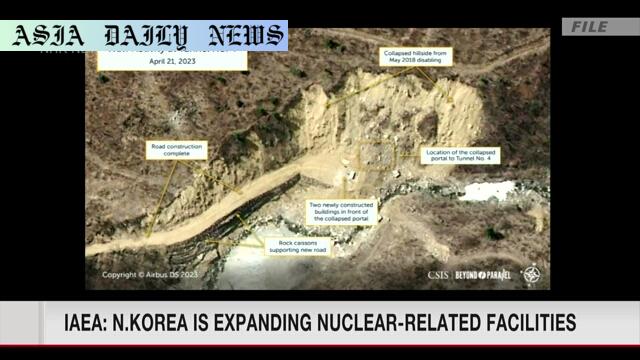North Korea: UN nuke violations continue, new Nyongbyon plant monitored.
North Korea is constructing a new nuclear-related facility in Nyongbyon.
Indications suggest operational light water reactor activity.
Punggye-ri site remains ready for nuclear tests if needed.
Actions violate multiple UN Security Council resolutions.
Kim Jong Un emphasizes nuclear enhancement by 2025 as per defense strategy.

North Korea’s Nuclear Expansion Raises Global Concerns
North Korea’s nuclear operations remain a significant concern for global peace and security as new developments suggest a steady and deliberate expansion of its capabilities. Recent reports from Rafael Mariano Grossi, Director General of the International Atomic Energy Agency (IAEA), reveal construction of a nuclear-related facility in Nyongbyon. With characteristics mirroring the Kangson enrichment plant, further activities seem oriented toward uranium enrichment and nuclear weaponization. Grossi emphasized the violations of the United Nations Security Council’s resolutions, labeling North Korea’s actions “deeply regrettable.” While some observers had hoped for a stagnation of nuclear advancements, continued developments defy international pressure for denuclearization.
Nyongbyon and Kangson: Unveiling the New Facility
The reported construction at the Nyongbyon nuclear site is significant. This facility has long been an essential asset to North Korea’s nuclear infrastructure. Reports suggest its dimensions align with facilities dedicated to uranium enrichment, similar to the Kangson enrichment plant. Such alignment reinforces intelligence reports claiming North Korea’s unwavering commitment to its five-year defense roadmap. It is noteworthy that Grossi’s analysis points to a “stable operation” of the light water reactor at the same location, further intensifying concerns about the growth of fissile material production capabilities in the region.
Punggye-ri Readiness Highlights Nuclear Commitment
Analysts have raised alarms over Punggye-ri, a key North Korean nuclear site reputed for its precedent-setting tests. Grossi highlighted that while no substantial changes have been observed there recently, it remains fully operational and ready to conduct nuclear tests. Its dormant readiness underscores a dual message: North Korea’s willingness to resume tests if diplomatic and global resistance increase and its technical capability to escalate the nuclear arms race instantly. For global powers and peace advocates, this readiness amplifies the urgency of negotiations with Pyongyang to stem advancements before situations spiral out of control.
Kim Jong Un’s Nuclear Strategy and Global Implications
North Korea’s nuclear strategy overseen by Kim Jong Un remains an intentional, calculated venture within its defense roadmap to match international military capabilities. The Workers’ Party newspaper Rodong Sinmun ratified Kim’s commitment, referencing a robust policy aimed at expanding nuclear capabilities by the 2025 deadline. This defiance against international sanctions and diplomatic negotiations places the Asia-Pacific security balance at risk. North Korea’s actions could encourage nuclear proliferation in neighboring regions while testing the resolve of global powers like the United Nations and the United States.
Global Reactions and the Call for Unified Action
The international community faces the daunting task of addressing North Korea’s escalating nuclear ambitions. UN agencies and diplomatic organizations must intensify sanctions and negotiations to ensure compliance with international norms. However, repeated violations under Kim’s leadership reveal diplomatic limitations, necessitating a multilateral approach led by powerful nations. With continued resistance toward such programs, the ultimate objective remains the denuclearization of the Korean Peninsula to restore stability. Robust cooperation between all concerned nations is essential to tackle this challenge effectively.



Commentary
The Global Impact of North Korea’s Nuclear Advances
North Korea’s nuclear advancements spark fresh debate over international security and geopolitical stability. The revelations from the International Atomic Energy Agency regarding Nyongbyon’s new facility intensify concerns among nations including South Korea, Japan, and the United States. At a time when the world endeavors toward de-escalation and denuclearization, such developments consistently defy global expectations and dampen the prospects of peace negotiations. Pyongyang’s actions signal not only nuclear defiance but also a strategic power assertion in the Asia-Pacific region.
Analyzing Intentions Behind the Nuclear Commitment
The intent behind Kim Jong Un’s persistent nuclear development suggests a drive not only for national defense but also for regional supremacy. North Korea often pursues such programs as leverage in diplomatic negotiations, emphasizing its nuclear capabilities as a deterrent. Additionally, the domestic narrative promoted by state media correlates nuclear strength with national pride and self-reliance. This propaganda-driven policy solidifies Kim’s leadership while sending a strong signal to perceived adversaries.
Strengthening Collective Responsibility
Addressing North Korea’s nuclear ambitions requires a collective, unified effort from the global community. Individual powerhouses like the United States must strengthen their collaborations with entities such as the United Nations and neighboring nations like South Korea and Japan. The focus should be on enforcing economic sanctions, initiating firm diplomatic overtures, and maintaining security across the region systematically. The stakes are high as unchecked nuclear progress risks triggering widespread proliferation and increases in regional hostility. To avoid such outcomes, proactive and sustained negotiations must take precedence.
Hope Amidst Challenges
While the reports from the IAEA paint a grim picture, there remains hope for progress. Strategic peace talks coupled with persuasive sanctions have historically yielded results, if not immediately. The lessons learned from international efforts against such nuclear developments must now drive efforts to engage North Korea’s leadership pragmatically. Despite today’s challenges, a global commitment to peace remains unwavering – marking the first step toward dismantling threats and ensuring cooperative security worldwide.